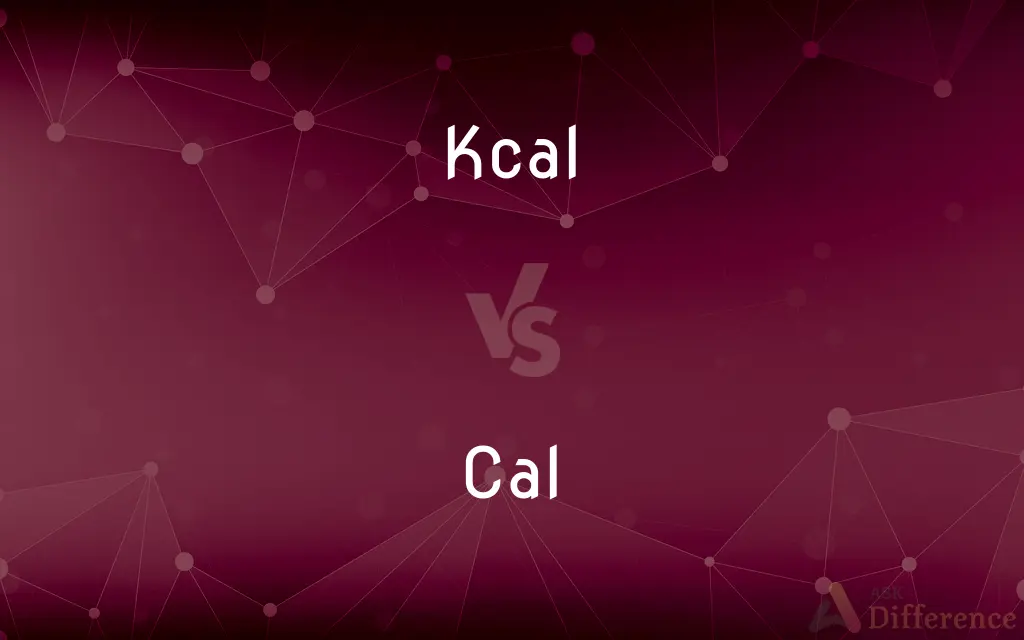Kcal vs. Cal — What's the Difference?
By Tayyaba Rehman — Published on December 27, 2023
Kcal represents 1,000 calories (cal), commonly denoting dietary energy. Cal is the energy required to raise 1 gram of water by 1°C.

Difference Between Kcal and Cal
Table of Contents
ADVERTISEMENT
Key Differences
The term Kcal stands for kilocalorie, which is equivalent to 1,000 calories. In nutritional contexts, when people refer to the "calories" in food, they are typically talking about kilocalories, or Kcal. Conversely, Cal, with an uppercase "C", is often used interchangeably with Kcal in the context of food, leading to some confusion. However, cal with a lowercase "c" represents the actual scientific unit of calorie, which is a much smaller measurement of energy.
Kcal and Cal, although related, have different magnitudes and applications. Kcal is prominently used in nutritional contexts to quantify the amount of energy provided by foods and beverages. On food labels, "Calories" (with an uppercase "C") usually refers to kilocalories, which can be synonymous with Kcal. Meanwhile, the cal (lowercase "c") is a scientific unit used in physics and chemistry, and it describes the amount of energy needed to raise the temperature of 1 gram of water by 1°C.
In everyday language, particularly in the United States, the Cal, denoting kilocalories, has become the standard reference on food packaging and in dietary discussions. This can sometimes create confusion since the scientific cal is a different, smaller unit. But Kcal and Cal (as kilocalories) represent the same amount of energy, which is 1,000 times greater than the energy represented by the scientific cal.
The distinction between Kcal and cal is essential for accuracy, especially in scientific settings. While everyday discussions about diet might blur the lines between them, understanding the difference is crucial in contexts that demand precision, such as laboratory measurements or academic research. Both Kcal and cal serve as measures of energy, but they operate on vastly different scales.
Comparison Chart
Full Term
Kilocalorie
Calorie
ADVERTISEMENT
Equivalent
1,000 calories
1 calorie
Common Usage
Nutrition (energy in food)
Physics and Chemistry (energy measurements)
Representation
Upper case "Kcal"
Typically upper case "Cal" for food, lowercase "cal" for scientific use
Energy Definition
Energy to raise 1 kilogram of water by 1°C
Energy to raise 1 gram of water by 1°C
Compare with Definitions
Kcal
A measure of dietary energy.
She consumed 1,500 Kcal today.
Cal
Amount of energy to raise 1 gram of water by 1°C.
The reaction produced 50 cal of heat.
Kcal
A larger unit than calorie used for food energy.
Dietary recommendations often suggest a daily intake of 2,000 Kcal for women.
Cal
A smaller measure of energy than kilocalorie.
Laboratory measurements sometimes require precision in cal.
Kcal
Kilocalorie, used in nutritional labeling.
The soda bottle indicates 150 Kcal per serving.
Cal
A unit of energy in the International System.
Heating this substance requires 20 cal.
Kcal
A unit representing 1,000 calories.
The chocolate bar contains 200 Kcal.
Cal
Often used interchangeably with Kcal in dietary contexts.
The juice contains 120 Cal, which means 120 Kcal.
Kcal
Energy amount equivalent to raising 1 kilogram of water by 1°C.
Burning fuel in the experiment released 5,000 Kcal of energy.
Cal
Represents either a scientific unit or food energy, depending on context.
While 1 Cal in food is 1 Kcal, in science, 1 cal is a much smaller energy unit.
Kcal
Abbreviation of kilocalorie
Cal
Wolfram, an ore of tungsten.
Common Curiosities
Is there a difference between Kcal and Cal in food labels?
No, on food labels, Cal and Kcal typically represent the same amount of energy.
How does Cal relate to food energy?
In dietary contexts, Cal (uppercase "C") often refers to kilocalories, or Kcal.
Why is Kcal more common in nutritional contexts?
Kcal provides a larger, more practical unit to represent food energy.
Can I use Kcal and Cal interchangeably in diet tracking?
Yes, in dietary contexts, 1 Cal is equivalent to 1 Kcal.
What is more significant, a Kcal or a cal?
A Kcal is 1,000 times greater than a cal.
How does the scientific cal differ from Kcal and Cal?
The scientific cal is 1/1,000th of a Kcal or Cal used in food contexts.
Why is there confusion between Kcal and Cal?
The use of Cal to denote kilocalories in food contexts blurs its distinction from the scientific cal.
Are both Kcal and cal units of energy?
Yes, but they operate on different scales, with Kcal being larger.
Are Kcal and Cal interchangeable?
In food contexts, yes. But in scientific contexts, cal is much smaller than Kcal.
What does Kcal stand for?
Kcal stands for kilocalorie, equivalent to 1,000 calories.
If a food item has 250 Cal, how many kcal is that?
It's 250 Kcal. In food labels, Cal and Kcal represent the same energy amount.
How is energy measured using cal?
Using cal, energy is the amount needed to raise 1 gram of water by 1°C.
Is the distinction between Kcal and cal important in daily life?
For most people, understanding that Cal on food labels equals Kcal is sufficient. The distinction is more critical in scientific contexts.
Can I find the term cal on food labels?
Rarely. Food labels typically use Cal or Kcal to denote kilocalories.
Which term is more prevalent in European food labeling, Kcal or Cal?
Kcal is more commonly used in European food labeling.
Share Your Discovery

Previous Comparison
PhD vs. JRF
Next Comparison
Windows 7 Professional vs. Windows 7 UltimateAuthor Spotlight
Written by
Tayyaba RehmanTayyaba Rehman is a distinguished writer, currently serving as a primary contributor to askdifference.com. As a researcher in semantics and etymology, Tayyaba's passion for the complexity of languages and their distinctions has found a perfect home on the platform. Tayyaba delves into the intricacies of language, distinguishing between commonly confused words and phrases, thereby providing clarity for readers worldwide.














































